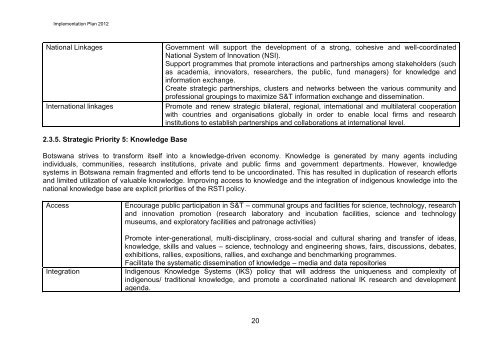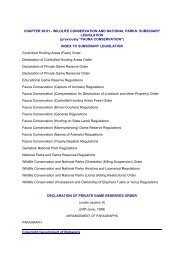to view full text - Botswana Environmental Information System
to view full text - Botswana Environmental Information System
to view full text - Botswana Environmental Information System
Create successful ePaper yourself
Turn your PDF publications into a flip-book with our unique Google optimized e-Paper software.
Implementation Plan 2012<br />
National Linkages Government will support the development of a strong, cohesive and well-coordinated<br />
National <strong>System</strong> of Innovation (NSI).<br />
Support programmes that promote interactions and partnerships among stakeholders (such<br />
as academia, innova<strong>to</strong>rs, researchers, the public, fund managers) for knowledge and<br />
information exchange.<br />
Create strategic partnerships, clusters and networks between the various community and<br />
professional groupings <strong>to</strong> maximize S&T information exchange and dissemination.<br />
International linkages Promote and renew strategic bilateral, regional, international and multilateral cooperation<br />
with countries and organisations globally in order <strong>to</strong> enable local firms and research<br />
institutions <strong>to</strong> establish partnerships and collaborations at international level.<br />
2.3.5. Strategic Priority 5: Knowledge Base<br />
<strong>Botswana</strong> strives <strong>to</strong> transform itself in<strong>to</strong> a knowledge-driven economy. Knowledge is generated by many agents including<br />
individuals, communities, research institutions, private and public firms and government departments. However, knowledge<br />
systems in <strong>Botswana</strong> remain fragmented and efforts tend <strong>to</strong> be uncoordinated. This has resulted in duplication of research efforts<br />
and limited utilization of valuable knowledge. Improving access <strong>to</strong> knowledge and the integration of indigenous knowledge in<strong>to</strong> the<br />
national knowledge base are explicit priorities of the RSTI policy.<br />
Access Encourage public participation in S&T – communal groups and facilities for science, technology, research<br />
and innovation promotion (research labora<strong>to</strong>ry and incubation facilities, science and technology<br />
museums, and explora<strong>to</strong>ry facilities and patronage activities)<br />
Promote inter-generational, multi-disciplinary, cross-social and cultural sharing and transfer of ideas,<br />
knowledge, skills and values – science, technology and engineering shows, fairs, discussions, debates,<br />
exhibitions, rallies, expositions, rallies, and exchange and benchmarking programmes.<br />
Facilitate the systematic dissemination of knowledge – media and data reposi<strong>to</strong>ries<br />
Integration Indigenous Knowledge <strong>System</strong>s (IKS) policy that will address the uniqueness and complexity of<br />
indigenous/ traditional knowledge, and promote a coordinated national IK research and development<br />
agenda.<br />
20




